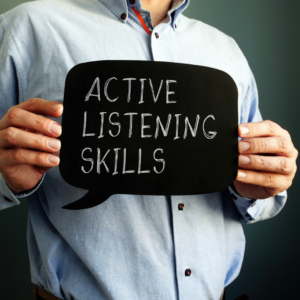It’s your anniversary, so you and your partner are heading to a charming, fancy little bistro that all your friends tell you is worth it.
You walk in the door, and the hostess is a delight. She seats you in a great spot, thanks you for your reservation and leaves you in the care of your server.
That was the hostess’s first mistake.
When your server comes to greet you and take your drink order, he has no idea what’s on the drink menu. Seriously? When he takes your dinner order, he’s never even heard of the dish you request. Oof. According to him, the restaurant doesn’t have a dessert menu? Double oof.
Safe to say it was a pretty unfavorable experience. You don’t return.
Where did things go so wrong? Well, besides the obvious, your server did not have any experience. Later, you learn that this is his first serving job.
In real life, you would be hard-pressed to find a swanky eatery with any one server who doesn’t have the right level of experience. Likewise, in B2C or B2B sales, you will have a tough time getting to the top without sales experience.
But how do you get that sales experience? Where do you begin?
Right here. Let’s get started.
Sales Experience Defined
There are many a question you might have about sales experience. But the first one we have to answer for you today is:
“What exactly counts as sales experience?” or “Is it a matter of taking an online sales training course, or more so a matter of a real-world, frontline sales job?”
Well, it’s not as one-sided as you might think. A lot of things count as sales experience, both of the above included. In general, though this particular type of professional experience means you have a history in sales in which you have:
- Spent face-to-face (whether virtually or in person) time with customers who want to buy something…
- Used some form(s) of communication to talk to those customers…
- Marketed and really “sold” a product or service to them through…
- Persuading those customers to buy that product or service because you showed them, in no uncertain terms, that they could not live the life they want to live without it.
That’s top-of-the-line stuff. That’s what turns a plain-ole peddler into a top-performing salesperson. That’s what dreams are made of when you want to succeed in sales, or recruit successful top talent as a business owner.
On the other hand, though, you do not have to define sales experience as something that gets you a paycheck.
Think way back to that precious bubble we call childhood. Did you ever go door-to-door for a school-sponsored fundraiser, selling chocolate bars or something similar? If you want to get technical, that’s sales experience too.
But when you’re trying to build your resume, selling Girl Scout cookies isn’t gonna cut it. You need to put more of a professional spin on it. Think: Workforce experience. That’s still pretty broad, though.
No worries; we have some more in-depth details on what kind of sales experience really counts below.
What Are Some Examples of Sales Experience?
Alright. Let’s get into the finer print.
If you’re looking to get into the sales game as a rep, or work your way up, we have some examples of what you can consider professional experience right here. We go over specific business-to-consumer (B2C) sales professions. We also go over business-to-business (B2B) sales after that.
What about if you’re a business owner, or top-talent recruiter? How will these apply to you? If you are looking for sales reps who will deliver consistent results and close more deals, you want candidates who have the right level of experience. Use this as a quick reference guide in those situations.
 B2C Selling
B2C Selling
People throw the word “sales” around indiscriminately.
“Oh, I’m in sales.”
“My dad is a salesman.”
“Sales seems stressful, no?”
But there are two main categories here, and distinguishing between the two is crucial. The sales skills you need to hone vary depending on the type of sales you’re in, for one. But there are countless other reasons you need to understand the differences between B2B and B2B sales.
When you enroll in sales training programs or sales classes, you want to find the best sales training for your particular career path. The reasons you need to grasp why the two overarching categories of sales differentiate between each other are countless. But the way in which they differ is for one major reason.
Business-to-consumer (B2C) sales are when your business, or the one you work for, has reps who sell its products or services directly to a consumer. This consumer is not buying for the purpose of their own business, or the one they work for. They are purchasing a product or service for their own personal reasons, to improve their own personal quality of life.
Here are some examples of B2C sales or B2C sales professions, where as a rep, you will sell your solutions to individual consumers:
- Real estate brokerage
- Product promotion
- Insurance agent
- Owning a food stand
- Associate in a retail store
- Cashiering
B2B Selling
Business-to-business (B2B) sales is different from that of B2C in that one major way we mentioned earlier. That is, B2B salespeople will sell their company’s products or services to another business.
For example, say that you are the head of the IT department for the home office of a huge retail franchise. You have a lot of employees under you who you work with in the office every day. But even though you see them almost daily, your communication throughout the department is lacking.
To address the issue, you reach out to a company that sells technology to streamline your communication processes. That’s B2B sales in action.
Here are the two subcategories of B2B selling:
- Inside sales – Inside sales is when you sell from a remote office location. You do not go out into the field to close in-person deals.
- Outside sales – Outside sales happen when you do go out into the field. You meet your prospects face-to-face to drive a hard bargain.
Tips on How to Get Sales Experience
You get the gist. Or at least, you’re starting to get the gist.
The type of experience you have is relative to your area of expertise: B2B or B2C sales. You shape your industry know-how around your real-world experience, like you would with any other area in your life.
You get it, you get it. We know.
But how do you get it? As in, how do you get that sales experience?
Below, we have five of the easiest tips you’ll ever need to get your foot in the door and build your way up to high-level sales experience.
Invest in a Sales Course and Training Programs
This should almost always be your first step. As you grow as a sales professional, you should refresh your memory with sales training too, of course. But you have to start with the basics as a newbie to sales, and that is exactly what sales courses allow you to do.
There are endless online and in-person programs you can choose from.
Begin with a basic, entry-level course to hone your selling skills and build your foundational knowledge. Then, once you know what area you want to get into, choose a specialized program. If the idea of SaaS companies is your speed, go for SaaS sales training. If there’s a B2B company that you really want to work for, select a B2B sales training program.
Start With Entry-Level Sales Jobs
You can find entry-level sales jobs everywhere you look. Like, everywhere.
This could be a cashiering role at a local small business. You could work for call centers that massive conglomerates outsource their customer service to. Believe us when we say that the pool of entry-level sales jobs hasn’t run dry in a while, and it won’t anytime soon.
Update your resume and have a cover letter on hand. Hop on LinkedIn, or Indeed. Make a few search queries and find a business in which you would be a good fit. Go to as many interviews as you can. Once you land the position, pay attention and learn as much as you can from your first sales job.
Highlight Your Transferable Sales Skills
So you’ve already worked in your first sales job. Nice work. But you’re ready to start moving your way up.
If you started as a sales associate or cashier at a retail shop, you want to fill some corporate-sized shoes.
Are you worrying about how your entry-level skills will translate into a more high-powered role? Don’t.
There are tons of general selling skills that you can make work for any other sales rep gig. You also might have unique experiences that you learned a lot from. Capitalize on that. In interviews, go into more detail on how those skills can transfer over to your new potential role. On your resume, expand on them. You can make it work, and you will.
Build Connections Both Online and Offline
Networking is your key to unlocking the door to endless opportunities. So get that key out and start trying some locks.
Join forums that focus on the area of sales that interest you the most. Optimize your LinkedIn profile and start making connections.
Are you more of an in-person sales guru? If so, you can keep an eye out for networking events and career fairs near you. Attend them. Participate in them. Engage with the people who attend them.
Who knows? The next one you go to could have a hiring manager, looking for someone just like you.
Read Sales-Related Books
People who write books– good books– on sales? They published those books for a reason. It’s because they have irreplaceable insight on what they’re writing about. A publisher saw something in them, and the subject they wrote about, and ran with it.
You can run with it too.
Check out bestseller lists for books on sales strategy. Head to Amazon and you’ll find hordes of different sales-related books on a slew of different topics. Go to your local bookstore and get some top-selling recommendations.
Critical Skills Every Salesperson Should Have
Remember when we talked about those transferable skills? You know: Critical sales skills that you can use in almost every selling situation or job?
We have them for you here…
Time-Management Skills
You need to be a multitasker to succeed in sales. Even if you think you’re a pro multitasker now, though, that might change as you start to grow within your career path.
Tasks are piling up. Calls keep coming in. You forgot to follow up with a high-quality lead…
When you develop your time-management skills, you won’t miss out on those opportunities anymore. You will know what to do and when to do it, setting a routine for yourself that works for years to come.
 Active-Listening Skills
Active-Listening Skills
When you talk to your leads, is that all you’re doing? Talking?
You need to listen too. More than that, you need to use active listening skills. This means you will engage, 100 percent, with your leads, prospects and current customers. You will know what they want before they even tell you. Then, you can offer solutions that match their needs and overcome their pain points every time.
That’s how you make sales, and make it in sales.
Relationship-Building Skills
Customer service is a vague career choice, but that doesn’t have to be a bad thing.
The skills you learn in customer service, like relationship building, are skills that carry over throughout your life in sales.
Consumers today don’t want to deal with one-size-fits-all approaches. Otherwise, they would have already bought a product online without talking to a salesperson.
So take advantage of that inherent buyer desire. Build a genuine connection– and lasting relationship– with them. This will help you with customer retention later on too.
Sales Closing Techniques
The way you close a sale is the cherry on top of a top-selling sundae.
How do you do it? Who do you want to emulate when you’re closing? Do you have any unique closing techniques that make you stand out from the rest?
There are tons of closing techniques for you to master. Read some books on them. Take a training course that highlights them. Start testing out your own spin on them.
Sales Prospecting
You have to fill your pipeline, and you have to start doing so as soon as you sit down to start selling every morning. But you won’t fill it at all if you are wasting your time on low-quality leads who never convert.
Prospecting skills allow you to find the right leads at the right time. Those are the leads who convert, and the leads who make your career as a salesperson flourish.
Product Expertise
Nobody is going to buy what you’re selling if you don’t know what you’re talking about.
With product expertise, you know your product or service from the inside out. That knowledge draws prospective buyers in. It makes them want to buy; it makes them need to buy. So study up, prepare yourself and be confident in what you sell.
Struggling to Recruit Salespeople With the Right Level of Experience?
Struggle no more. We mean it.
Because here at Selling Revolution, we know how to recruit and retain top talent for your business. Better yet, we can get you top talent with sales experience that lends itself to your company-wide success.
But we need to work with you to bring you that home-grown success. We need to collaborate. Once we do, we can get you more than a top talent recruitment plan. You’ll end up with better leads, customizable sales training and more, too.
So, do you have the time to invest in growing your company and maintaining that level of growth? We do.

![How To Get Sales Experience [5 Super Easy Tips]](https://sellingrevolution.com/wp-content/uploads/2021/12/Featured-How-To-Get-Sales-Experience-5-Super-Easy-Tips.png)
 B2C Selling
B2C Selling
 Active-Listening Skills
Active-Listening Skills